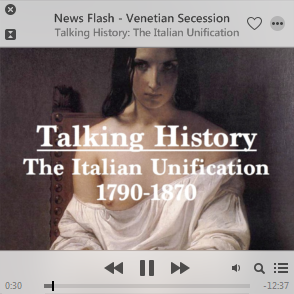Søren Krarup is an 18 year old Danish high school student who is about to take his final exams and as a result there will be a one month hiatus in his podcast
The history of Denmark (
feed). No need to apologize, Søren ; what is a month? I have so many other podcasts in my playlist. Anyway, here is part ONE of the review.

Where in the world can we expect from a youth who has not even finished his school to supply a full fledged history podcast and in another than his native tongue? Krarup pulls it off with flying figures and fills in yet another gap in the large supply of '
The history of [this country]' podcasts. His English, although with a slight accent, is fluent; his writing is perfect; his presentation very professional, his structure is a straightforward chronological telling of Danish history - everything is in the right place and done properly. Speaking of language: there are a large number of German names in his history so far, and these he pronounces with a flawless German accent. I am extremely sensitive to language, so this is a sheer delight.
A lot of my readers are history podcasters and would be history podcasters and I would like to point to Krarup's work as an example. I was raving about Zack Twamley (
When dimplomacy fails) the other day as the exemplary history podcaster of this day and age, but his may be a tough standard to emulate. So I would suggest to begin by looking at
The History of Denmark in order to get a good view of the basics - this is what you have to get right. And as for the readers of my blog who are interested in Denmark, we have enough to recommend the podcast. Follow the URL, subscribe and take it all in.
In my earlier blogging days I would have stopped at this point, but now I wish to share my thoughts on how to get it to the next level. And this is meant generally. Every podcaster should make these considerations, and if I apply it to
The History of Denmark, then that is a concrete example and definitely no reason to say Søren Krarup is doing something wrong. If anything it is how to get it better. On to part TWO of the review.
 |
| The Jelling stone mentioning Gorm and Denmark |
In the last episode Krarup happily announced he had some 400 subscribers to the podcast. After I publish my review, he will get instant exposure to another 200-2000 potential subscribers. What will convince these readers to go and subscribe? It could easily double or even triple the listener base, but what would bring my readers to spend time with Denmark, when there is also Latvia, Bulgaria, Italy, Germany, England, Japan, China and on and on? Can you expect them to be interested in Denmark? Would they subscribe simply because Denmark's history has not yet been covered in another podcast? And what if it has? Why Krarup's podcast? Actually, I wonder if the mere reason that Denmark was not covered yet in podcast could in earnest be enough reason for Krarup to make one.
The question what makes Denmark interesting can potentially be met by a wide range of answers, but it struck me that the way this podcast is structured, has one question almost pushing itself to the forefront. The country boasts to be the oldest Kingdom in the world. Krarup emphasizes with tangible pride in one of the early episodes that the current queen of Denmark is a direct descendant of Gorm the Old, who is mentioned in the runes on the 10th century Jellingstenen which is the oldest source referring to the country by its name Danmark. So we have a country here of stable continuity spanning over a 1000 years.
Continuity over such a long time is not common in history, so there is the first question: How can a small country maintain its social, linguistic and political continuity over such a long time? It has had its share of civil war, succession crises, occupation and unions with other countries, just like others, yet it stayed the same (it did, did it not?) - what explains that?
Any podcaster who embarks on a series and poses such a central question, gives purpose to the project and greater power of keeping the listeners tied in. As a matter of fact, every episode should have such a question (Like: How did Valdemar manage to win the Danish civil war and reunite the Danes?) to draw us in again and again. It certainly makes this Israeli crave for the next episode on the edge of his seat. One month waiting will be such a long time.
 |
| The world's oldest Kingdom |




















